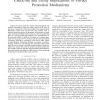Free Online Productivity Tools
i2Speak
i2Symbol
i2OCR
iTex2Img
iWeb2Print
iWeb2Shot
i2Type
iPdf2Split
iPdf2Merge
i2Bopomofo
i2Arabic
i2Style
i2Image
i2PDF
iLatex2Rtf
Sci2ools
NDSS
2015
IEEE
2015
IEEE
Predicting Users' Motivations behind Location Check-Ins and Utility Implications of Privacy Protection Mechanisms
—Location check-ins contain both geographical and semantic information about the visited venues, in the form of tags (e.g., “restaurant”). Such data might reveal some personal information about users beyond what they actually want to disclose, hence their privacy is threatened. In this paper, we study users’ motivations behind location check-ins, and we quantify the effect of a privacy-preserving technique (i.e., generalization) on the perceived utility of check-ins. By means of a targeted userstudy on Foursquare (N = 77), we show that the motivation behind Foursquare check-ins is a mediator of the loss of utility caused by generalization. Using these findings, we propose a machinelearning method for determining the motivation behind each check-in, and we design a motivation-based predictive model for utility. Our results show that the model accurately predicts the loss of utility caused by semantic and geographical generalization; this model enables the design of utility-awar...
| Added | 15 Apr 2016 |
| Updated | 15 Apr 2016 |
| Type | Journal |
| Year | 2015 |
| Where | NDSS |
| Authors | Igor Bilogrevic, Kévin Huguenin, Stefan Mihaila, Reza Shokri, Jean-Pierre Hubaux |
Comments (0)

